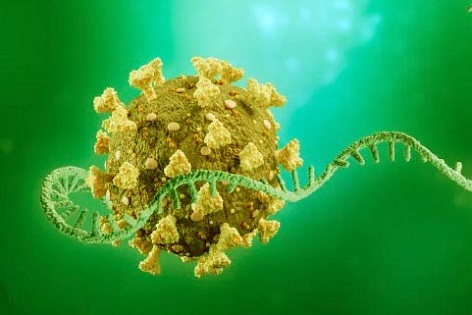Nikhil Prasad Fact checked by:Thailand Medical News Team Aug 12, 2024 1 year, 5 months, 3 weeks, 3 days, 1 hour, 4 minutes ago
COVID-19 News: A groundbreaking study conducted by researchers from the University of Bern, Switzerland, has shed light on a crucial mechanism utilized by the SARS-CoV-2 virus to hijack the human host's cellular machinery. The study, conducted by scientists from the Department of Chemistry, Biochemistry and Pharmaceutical Sciences, as well as the Multidisciplinary Center for Infectious Diseases, and the Institute of Cell Biology, all affiliated with the University of Bern, reveals how the virus's non-structural protein 1 (Nsp1) is instrumental in degrading human messenger RNA (mRNA), a key process that enhances viral proliferation.
 Swiss study unveils SARS-CoV-2 Nsp1 protein's role in human mRNA destruction
Swiss study unveils SARS-CoV-2 Nsp1 protein's role in human mRNA destruction
This
COVID-19 News report delves into the findings of this pivotal study, highlighting the role of Nsp1 in the suppression of host protein synthesis and its subsequent impact on the human immune response.
The Role of Nsp1 in Viral Proliferation
Nsp1 is the first viral protein produced during coronaviral infections, including SARS-CoV-2. It plays a pivotal role in hijacking the host's gene expression machinery, redirecting it to serve the needs of the virus. The protein has two primary functions: it inhibits the synthesis of host proteins and triggers the degradation of host mRNA. This dual action not only suppresses the host's immune response but also ensures that the virus can replicate efficiently within the host cells.
The study utilized a human cell-free translation system to explore the functions of Nsp1, with a particular focus on its role in mRNA degradation. Researchers found that the Nsp1 protein from SARS-CoV-2 binds to the ribosome, the cellular machinery responsible for protein synthesis, and induces the degradation of host mRNA. This process occurs independently of the translation inhibition, meaning that even without stopping the translation of host proteins, Nsp1 can still degrade mRNA.
Decoupling Translation Inhibition and mRNA Degradation
One of the most intriguing aspects of the study is the discovery that Nsp1 can induce mRNA degradation without the need for translation inhibition. This finding challenges the previously held belief that the two processes were interconnected. By decoupling these activities, the researchers demonstrated that the binding of Nsp1 to the ribosome is sufficient to trigger mRNA degradation.
This was further confirmed by experiments showing that Nsp1 from Middle East Respiratory Syndrome Coronavirus (MERS-CoV) inhibits translation without causing mRNA degradation. This distinction underscores the unique mechanisms employed by different coronaviruses to manipulate host cell functions.
How Nsp1 Targets Human mRNA
The study also revealed that Nsp1-mediated mRNA degradation primarily targets the 5' untranslated region (UTR) of the host's mRNA. This region is crucial for the initiation of translation, and its degradation effectively shuts down the prod
uction of host proteins. Interestingly, the degradation process does not require active translation, as shown by the study's use of translation inhibitors like puromycin and rocaglamide.
The researchers also noted that the presence of specific viral RNA sequences, such as the Stem-loop 1 (SL1) hairpin at the 5' end of viral transcripts, protects viral mRNAs from Nsp1-induced degradation. This suggests that SARS-CoV-2 has evolved mechanisms to safeguard its RNA while targeting host mRNA for destruction.
Implications for Therapeutic Development
The study's findings have significant implications for the development of antiviral therapies. Understanding the precise mechanisms by which Nsp1 degrades host mRNA opens up new avenues for targeting this protein and potentially disrupting the virus's ability to replicate.
The researchers tested several small molecules, including ametantrone and montelukast, for their ability to inhibit Nsp1 activity. However, these compounds did not effectively block Nsp1's ability to degrade host mRNA, highlighting the need for continued research in this area. The quest for effective Nsp1 inhibitors remains a priority in the fight against COVID-19.
Nsp1's Evolutionary Adaptation
The study also provides insights into the evolutionary adaptations of Nsp1 across different coronaviruses. By comparing the Nsp1 proteins from SARS-CoV-2, MERS-CoV, and Bat-Hp coronaviruses, the researchers observed that each virus has developed species-specific mechanisms to protect its mRNA from degradation. This co-evolutionary relationship between Nsp1 and viral mRNA underscores the complexity of viral-host interactions and the challenges of developing broad-spectrum antiviral therapies.
Conclusion
This study marks a significant step forward in our understanding of how SARS-CoV-2 hijacks the host's cellular machinery to ensure its replication and proliferation. By elucidating the role of Nsp1 in mRNA degradation, the researchers from the University of Bern have provided valuable insights that could inform the development of new therapeutic strategies against COVID-19 and other coronaviral infections.
The study findings were published on a preprint server and are currently being peer reviewed.
https://www.biorxiv.org/content/10.1101/2024.08.05.606569v1
For the latest
COVID-19 News, keep on logging to Thailand Medical News.
Read Also:
https://www.thailandmedical.news/news/nsp1-orchestrates-sars-cov-2-replication-via-manipulation-of-calcineurin-nfat-signaling
https://www.thailandmedical.news/news/sars-cov-2-research-vietnamese-researchers-discover-that-sars-cov-2-nsp1-proteins-bind-to-ribosome-40s-subunits,-inhibiting-mrna-translation
